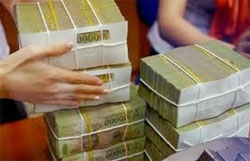SOE profit debate heads in different directions
 Under a new draft decree on state capital investment and financial management at wholly state-owned enterprises (SOEs) currently being crafted by the Ministry of Finance (MoF), after paying corporate income tax and pooling capital into funds such as the risk hedge funds, SOEs would be obliged to hand half of the remaining profits to funds managed by the State Capital Investment Corporation (SCIC). The remainder can go towards SOEs’ investment development fund, social welfare and bonus funds and the like.
Under a new draft decree on state capital investment and financial management at wholly state-owned enterprises (SOEs) currently being crafted by the Ministry of Finance (MoF), after paying corporate income tax and pooling capital into funds such as the risk hedge funds, SOEs would be obliged to hand half of the remaining profits to funds managed by the State Capital Investment Corporation (SCIC). The remainder can go towards SOEs’ investment development fund, social welfare and bonus funds and the like.
This means, instead of wholly state firms holding all profits as currently, half of the profits would go to state coffers.
MoF’s Corporate Finance Department deputy head Dang Quyet Tien assumed the proposal would help ensure impartiality between the state, enterprises and workers, while deterring capital intensive firms from putting money into risky non-core businesses.
“Like other owners, the state owner has the right to pick yields from its capital ventures. But unlike other owners, the state only takes back part of the profits and allow firms to use the remaining portion to benefit the labourers,” said Tien.
Echoing the idea, National Assembly’s Economic Committee senior expert Tran Du Lich said scores of SOEs particularly those in mining, oil and gas sectors saw a big share of their profits coming from exploiting natural resources. Therefore, directing this profit into state coffers would be necessary and each year the state could decide on reinvesting this sum into state corporations needing state capital injection.
Hanoi Financial Department deputy head Le Thi Loan suggested transferring the sum to localities’ enterprise development funds instead of SCIC’s fund for SOE development.
“This sum can be used to procure shares via additional distributions at SOEs, avoiding state capital portion retrenching in areas in which the state must hold a ruling role,” said Loan.
The business community, however, strongly protested the proposal.
Vietnam General Corporation of Agricultural Materials chairman Le Xuan Son assumed the initiative was a setback.
“The state still gains dividends when SOEs use profits for production and business expansion,” said Son.
A state cement conglomerate Vicem representative said the equity capital portion of many SOEs was low. Some projects lacked 80-90 per cent of investment capital, but could not source bank loans as banks often look at firms’ equity before making lending decisions.
What the stars mean:
★ Poor ★ ★ Promising ★★★ Good ★★★★ Very good ★★★★★ Exceptional
Related Contents
Latest News
More News
- Hermes joins Long Thanh cargo terminal development (February 04, 2026 | 15:59)
- SCG enhances production and distribution in Vietnam (February 04, 2026 | 08:00)
- UNIVACCO strengthens Asia expansion with Vietnam facility (February 03, 2026 | 08:00)
- Cai Mep Ha Port project wins approval with $1.95bn investment (February 02, 2026 | 16:17)
- Repositioning Vietnam in Asia’s manufacturing race (February 02, 2026 | 16:00)
- Manufacturing growth remains solid in early 2026 (February 02, 2026 | 15:28)
- Navigating venture capital trends across the continent (February 02, 2026 | 14:00)
- Motivations to achieve high growth (February 02, 2026 | 11:00)
- Capacity and regulations among British areas of expertise in IFCs (February 02, 2026 | 09:09)
- Transition underway in German investment across Vietnam (February 02, 2026 | 08:00)

 Tag:
Tag:




















 Mobile Version
Mobile Version